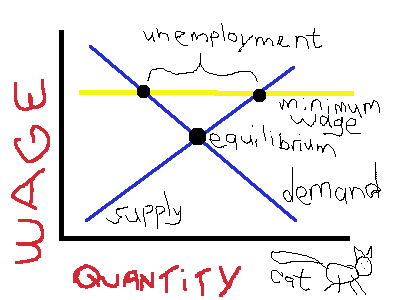CA minimum-wage hike: Expect 'very large' effect on low-wage jobs

Gov. Jerry Brown's signalling that he'll approve a bill to raise in two steps the minimum wage from $8 an hour to $10 an hour has prompted the usual dumb coverage of minimum wage increases, which notes that business groups/Republicans warn this will lead to the loss of jobs while “social justice” activists/Democrats dismiss such claims. In a state in which nearly one in five adults who want full-time jobs but can't find one, this is not a minor issue.
 The reality is that there is lots of squabbling over the overall effect of a hike in the minimum wage. But there isn't much on the question of whether or not such hikes lead to the loss of jobs. I've been reading National Bureau of Economic Research reports for 20 years, as opposed to politically driven soundbites, and here's your common- sense consensus:
The reality is that there is lots of squabbling over the overall effect of a hike in the minimum wage. But there isn't much on the question of whether or not such hikes lead to the loss of jobs. I've been reading National Bureau of Economic Research reports for 20 years, as opposed to politically driven soundbites, and here's your common- sense consensus:
“Economists have long believed that minimum wages destroy jobs for low-wage workers. Nonetheless, many studies have found that the effects of minimum wages are small, even for young workers. But in a recent NBER study, Minimum Wages and Youth Employment in France and the United States (NBER Working Paper No. 6111), John Abowd, Francis Kramarz, Thomas Lemieux, and David Margolis find that the minimum wage has had very large negative effects on the group of French and American youths whose low wages put them most at risk.
“In France, the minimum wage has been rising in real terms in the last five decades. Between 1951 and 1994, the French minimum wage rose from 1.95 francs an hour to 6.92 francs an hour in 1994, both measured in 1970 francs, an increase of 255 percent. The French minimum wage in 1994, measured in 1997 dollars, was over $6.50 an hour.”
A clear finding, not a fuzzy one
 “To check for an effect of the minimum wage, the authors tracked the employment of workers whose wage, just prior to the increase, was above the previous minimum wage but below the new higher minimum wage. Such workers, they reason, would be most likely to be priced out of work by the increase in the minimum wage. The authors find that, for French men aged 25 to 30 who were in this marginal category, an increase of 1 percent in the minimum wage reduced their probability of keeping their job by 4.6 percent.
“To check for an effect of the minimum wage, the authors tracked the employment of workers whose wage, just prior to the increase, was above the previous minimum wage but below the new higher minimum wage. Such workers, they reason, would be most likely to be priced out of work by the increase in the minimum wage. The authors find that, for French men aged 25 to 30 who were in this marginal category, an increase of 1 percent in the minimum wage reduced their probability of keeping their job by 4.6 percent.
“In the United States, on the other hand, the minimum wage stayed constant at $3.35 an hour from 1981 until the late 1980s, which means that, adjusted for inflation, the minimum wage fell. Therefore, the authors took the opposite tack with U.S. data, examining the employment records in earlier periods of workers earning the minimum wage in later periods. They speculate that many such workers are likely to be priced into the labor market as the real minimum wage falls, after having previously been unable to find jobs at the earlier high real minimum. The evidence confirms this: Abowd and his coauthors conclude that a 1 percent decrease in the real minimum wage increases by 2.2 percent the probability that a young man employed at the minimum wage was out of work in the previous period.”
'Low-skilled labor' to suffer the most
I give the last word to George Mason University economist Tyler Cowen, who runs the best economics blog and seems to me to be the most apolitical prominent academic in the U.S. (which is why he is Paul Krugman's most effective critic; he even co-authored a paper on disagreement that appears to be a stealth attack on Krugman's unwavering, messianic certitude):
Related Articles
Collective bargaining behind the scenes
May 15, 2013 By Katy Grimes Government employees’ salaries and benefits, and in particular, pensions, are financially unsustainable in California.
Changing CA politics: What’s the biggest potential shift?
The open-primary success of relatively moderate GOP candidates in statewide races has prompted lots of thumbsucker punditry lately. For example,
Train Wreck Keeps Rolling
Katy Grimes: With the Legislature’s ongoing guaranteed votes to allow California’s High Speed Rail Authority project to continue without financial



